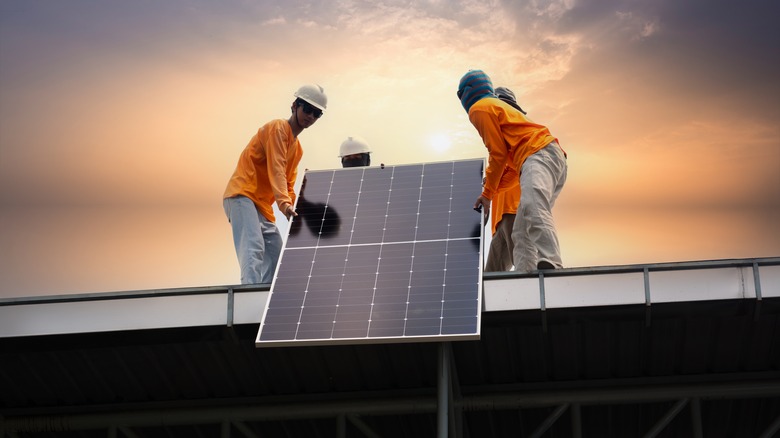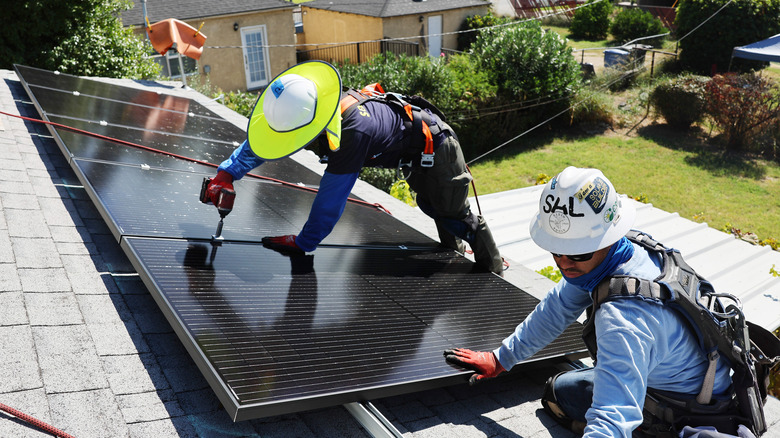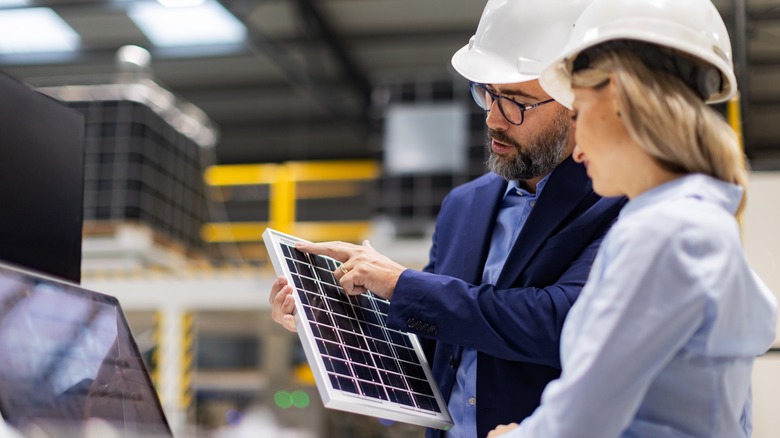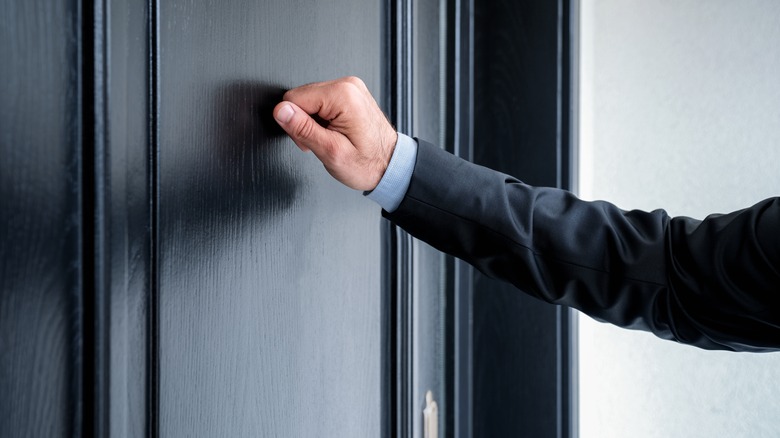5 Of The Most Common Solar Panel Scams (And How To Avoid Them)
Installing solar panels on your home has obvious benefits; you passively soak up and store power on a sunny day, which lets you draw less from the public grid and save a few bucks on utility bills. The idea that you won't have to pay for electricity at all is one of the common solar panel myths, but it's a helpful boost to keep costs down and reduce fossil-fuel use. Still, there's a lot to know before installing solar panels on your home. And as with every good thing in life, there are those out there who seek to exploit solar panels for a quick buck.
Since home solar panel installation is still a relatively young business, there's ample room for bad actors to wiggle their way in to make a go at your wallet. Sometimes these scams arise from genuine, if rather shady, solar companies using hostile or annoying business tactics, while others are the work of full-on crooks looking to sell you a lemon for far more than it's worth. It's on you to be vigilant and watch for the red flags so you don't end up in the hole on fees or a victim of identity theft. Here are a few of the most common angles bad actors can try, as well as how to counter them.
We'll install your solar panels for free!
As the old saying goes, the best things in life are free. Naturally, if you were offered something cool and useful like solar panels for no cost, that would be very appealing. This is why it's a common tactic for solar panel companies to offer you installation and usage "completely free of charge." It's a tempting offer, as solar panel installation can be pricey, and how long it takes for solar panels to pay themselves off may surprise you. Unfortunately, as another old saying goes, there's no such thing as a free lunch.
Often, if a solar panel company is offering you solar panels "for free," what that really means is that they'll install the panels with no down payment. This still sounds nice on paper, until you start getting monthly usage bills nobody told you about. If you ever receive an offer for "free" solar panels, make sure you ask whether they're actually free or just free to install, and in either case, what fees will follow. A good solar company will give you all the pricing information upfront, while a bad one will try to obfuscate the actual cost you'll incur from installation and usage.
Act now, or this deal is gone forever!
A classic tactic in just about any business sector is time-limited sales. We've all fallen for an online flash sale every now and then — you want to make sure you're getting the best possible price, which means you end up pulling the trigger on a purchase before you've properly thought about it. Some solar companies make use of this tactic, offering you a special price or financing on an installation deal, then warning you that you absolutely have to agree to it then and there. If you refuse, it's gone forever and you'll never get a better price.
This, of course, is just marketing mumbo-jumbo. Any and all purchases, especially large and potentially expensive ones like solar panels, should be carefully read over with due diligence. If they're trying to pressure you into making a choice before you can read the fine print, there's probably something in there they don't want you to see.
You can only install this kind of solar panel!
Every company that performs some manner of labor or installation has brands it prefers to work with. Maybe they have a formal business relationship with certain parts suppliers, or they just don't feel like filling out the paperwork for another brand. Either way, some low-grade or shady solar companies may inform you either before or after you've signed a contract that you can only get solar panels from a single brand.
While this isn't as outright harmful as some other solar scams, it could lead to you receiving inferior panels, or those that simply don't meet your usage needs. If a solar company insists that you have to use a single brand of panel, it's probably less because they believe that, and more because they need a kickback. A proper company will let you use whatever panels you like, which gives you plenty of room to research options and find the panels that work best for you.
The solar tax credit will be phased out soon!
One of the big draws to have solar panels installed on your home is the solar tax-credit system. To encourage the adoption and use of solar technology, the U.S. government offers federal tax credits to private citizens and businesses that have them installed. These credits can be claimed when you file your taxes for the year. While they aren't nearly enough to cover the cost of installation, they can offset part of the price and reduce some of the installation sticker shock. In a similar vein to time-limited deals, though, a shady solar salesperson may tell you that this system is nearing its conclusion.
A solar salesperson may warn you that you need to have solar panels installed right away, as the solar tax credit system is close to being discontinued and you won't get that government check if you wait. First of all, this is a complete fabrication. Following the passing of the Federal Inflation Reduction Act in 2022, the current 30% federal tax credit will remain in effect until 2032, and even then, it will only gradually decrease in 2033 and 2034 (it's set to expire in 2035 if Congress doesn't extend it). Secondly, you don't get a check from the government for solar tax credits; they just decrease your taxes. Any warning about solar tax credits is a line they're trying to feed you.
I'm a representative of a solar company/your utility company!
It's surprising to realize, but door-to-door salespeople still very much exist. That said, there's a big difference between some salesperson trying to sell you a set of crummy kitchen knives and trying to sell you a solar panel installation. Door-to-door solar salespeople aren't inherently bad, but you need to take them with a pinch of salt. A rep from a real, reputable solar panel company will provide you with information and an avenue for later contact if you're interested. A bad actor may try to pressure you into a contract right at the door, asking you to fill out a suspiciously detailed form so they can bombard you with half-baked package offers. This is assuming they're not just a scammer looking to get a big deposit in exchange for literally nothing.
In a similar vein, you may get a door-to-door knocker claiming to be a representative of your local utility company, going around advising residents to have solar panels installed. This is even more ridiculous, as a utility company wouldn't send a rando around to people's doors. Whether you have someone falsely claiming to be representing your utility company or a nonexistent solar company, you can report them to the Federal Trade Commission for violating its Impersonation Rule. Even if you believe a solar company to be legit, you should still check it out in the Better Business Bureau's database to search for any additional red flags.





